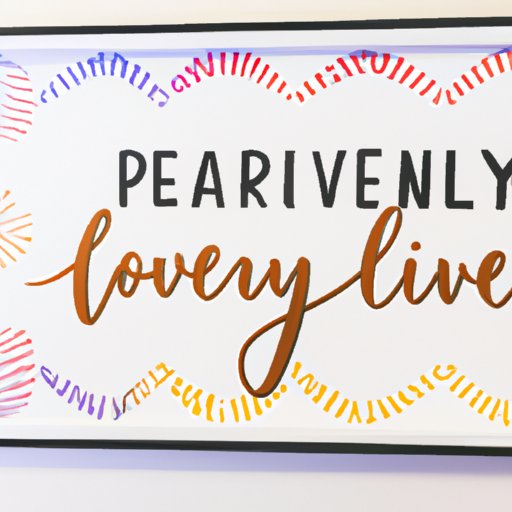I. Introduction
A personal development plan is a roadmap for achieving your goals and improving your life. It allows you to identify areas where you want to grow and develop strategies for making positive changes. By creating a plan, you can stay on track and motivated, even when challenges arise. In this article, we’ll explore the key elements of a good personal development plan and offer practical tips for creating one.
II. Structure your personal development plan
Before you start setting goals, it’s important to organize your thoughts and create an outline for your plan. Break down your goals into manageable steps and create a timeline for achieving them. Consider using a spreadsheet or digital tool to keep track of your progress.
When outlining your goals, start with the big picture and then work backward. For example, if your long-term goal is to start your own business, break that down into smaller goals, such as developing a business plan, securing funding, and launching your product. Assign specific deadlines for each goal, and create strategies for achieving them.
III. Define your goals
When setting goals, it’s important to make them specific, achievable, and measurable. A vague goal, such as “be more productive,” is not as effective as a specific goal, such as “complete three tasks each day.”
Start by identifying what you want to achieve. Do you want to improve your health, your career, or your relationships? Once you have a general idea, break that down into specific goals. For example, if you want to improve your health, your goals might include exercising three times a week, eating more fruits and vegetables, and getting a full night’s sleep each night.
IV. Seek out inspiration
Staying motivated is critical to achieving your goals, and one way to stay inspired is to seek out resources that support your development. Look for books, podcasts, or blogs that offer tips and strategies for achieving your goals.
For example, if you’re interested in improving your productivity, you might try reading books like “The 7 Habits of Highly Effective People” by Stephen Covey or “Getting Things Done” by David Allen. Podcasts like “The Tim Ferriss Show” or “Happier with Gretchen Rubin” can also provide valuable insights and inspiration.
V. Find an accountability partner
An accountability partner is someone who helps you stay on track and provides support as you work towards your goals. This can be a friend, family member, or coworker who shares your values and goals.
When looking for an accountability partner, consider someone who is positive, supportive, and reliable. Be clear about your goals and expectations, and establish a regular check-in schedule. This can be done in person, over the phone, or through a digital platform like Skype or Zoom.
During these check-ins, share your progress and discuss any challenges or obstacles you’ve encountered. Your accountability partner can offer advice and support, and help you stay motivated and on track.
VI. Review and adjust regularly
A personal development plan is not a static document; it’s important to review and adjust it regularly. As you achieve your goals, set new ones to continue your growth and development. If a particular strategy isn’t working, be open to making changes.
It’s also important to reassess your plan regularly to ensure that it’s still aligned with your values and priorities. Twice a year is a good benchmark for reviewing your personal development plan. During these reviews, consider what you’ve accomplished, what you still want to achieve, and whether your strategies are still effective.
VII. Conclusion
A personal development plan is a powerful tool for achieving your goals and improving your life. By structuring your plan, defining your goals, seeking out inspiration, finding an accountability partner, and reviewing and adjusting your plan regularly, you can create a roadmap for your growth and development.
(Note: Is this article not meeting your expectations? Do you have knowledge or insights to share? Unlock new opportunities and expand your reach by joining our authors team. Click Registration to join us and share your expertise with our readers.)
